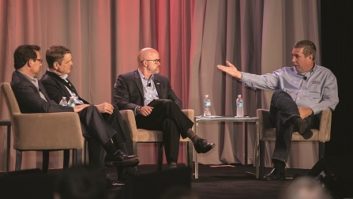It was the best of times, it was the worst of times.
So begins Dickens’ “A Tale of Two Cities,” the 1859 novel.
For an optimist, that phrase could describe radio today as it battles competition on every side, yet also looks for opportunities in new platforms. The Radio Advertising Bureau tends to be made up of optimists.
The organization’s annual conference this month will consider topics such as selling during the economic meltdown, the best ways to reach the listener via mobile technology and monetizing that former poor cousin of radio that has taken over our lives: the Internet.
“These are challenging times for the U.S. economy and the media sector including radio,” said Jeff Haley, president and CEO of the RAB. “However radio has tremendous strength in flexibility and efficiency that can help marketers and retailers reach consumers.”

©iStockphoto/T.MC Part of that flexibility is radio’s power to customize advertising for the Internet, according to Eric Ronning, president of sales for TargetSpot, a New York company that helps stations bring advertisers and listeners together online, who will speak in a session about digital expertise.
“Compared to TV and print, radio has a good price point and it’s easy to localize,” he said. “Radio always does comparatively well in difficult advertising environments.
“We also think radio will do well this year because of the digital connection. In the past, if an advertiser bought the 25–49 demographic, a lot of his money leaked outside of that. This year, online radio is able to target down to the ZIP code to ensure the person listening hears the ad in the location most beneficial to the advertiser.
“We call this ‘follow the listeners instead of following the call letters.’ We understand that there is a higher expectation of accountability now in advertising. Online radio makes it possible to be part of that conversation. So we can show advertisers that radio is not a dinosaur medium. In fact, it’s one of the most exciting media going forward.”
One of the economy-related sessions will feature Jeffrey Hedquist, president/creative director, Hedquist Productions of Fairfield, Iowa.
“I see successful stations as multi-media creators, producing audio, video and electronic word content delivered over a variety of media platforms,” he said. “They won’t just be selling radio time.”
He also stressed that the key to making money goes beyond understanding the delivery systems.
“Knowing how to deliver alone will not serve us,” he said. “It’s knowing what to deliver that will save us. The same techniques that worked around the campfire will work over any platform.”
The Buck speaks here
Buck Robinson, president/CEO of Robinson Radio, will talk about tapping two “untouched” multi-billion dollar markets.
“Long-form advertising is one potent source of revenue,” he said. “While we think of ‘infomercials’ as tacky, over-the-top denizens of late-night TV, some Fortune 500 companies are now embracing the additional time that infomercials allow to effectively convey their products’ benefits and competitive advantages. Even our own president turned to a prime-time 30-minute block to help him gain office.”
The other area Robinson fervently touts is social networking sites.
“Are your kids on Facebook or MySpace?” he asked. “Radio stations have always enjoyed a very intimate relationship with their listeners, so why aren’t more of them leveraging the power of social networking to actively cement that bond and grow audience interaction?”
If there is a silver lining to the bad economy, it might be that radio stations are now forced to become creative. Ask Tila Comstock, general sales manager, Beasley Broadcasting, Fayetteville, N.C. Her cluster owns a 40.7 share of the market.
“We don’t use the old way of thinking about just radio commercials,” she said. “We look for what our clients’ budgets will allow, and maybe a little more.
“Our smaller advertisers with whom we work directly often don’t have a Web site, so we can create one for them. It’ll be embedded in our stations’ Web sites, but it can use audio and video. Clients can even run their cable TV ads on the Web page we create for them. We have an Internet specialist at each of our clusters and this allows us to become more competitive. With contesting on our Web pages, we are building our databases. There’s almost nothing we won’t do.”
Also eschewing “old ways” is Wayne Ens, president of Ens Media of Ontario, Canada. His session will discuss “New Guided Discovery Selling.”
“Old techniques never did work efficiently,” he said. “They relied on the math of making tons of unprepared calls in the hopes of tripping on someone who was ready to buy. Rude interruptions, otherwise known as ‘cold calls,’ simply undermine trust; and it’s trust that has to be the foundation of partnering business relationships.”
What is Ens’ solution?
“We know that it takes five to seven valid business contacts, those that benefit the advertiser, to get a decision-maker to trust you. Clients can be systematically guided to discover the benefits a particular radio rep delivers.”
Music, messages on the move
Makers of mobile devices, including cell phones, iPods and other MP3 players, are trying to eclipse radio as the prime content supplier. Some radio stations fight this technology; others embrace it.
Ivan Braiker is CEO of HipCricket, a Kirkland, Wash., firm that specializes in mobile marketing. He will be one of the speakers in a session about “going mobile.”
“Despite the recession, KTCK(AM), ‘The Ticket’ in Dallas, leveraged its mobile database and doubled its cume in each of the three quarter-hours that Cowboys ‘programming push messages’ were sent,” he said. “Jiffy Lube saw more than 50 percent new customers through a mobile coupon program with Clear Channel’s KCCQ(FM), Ames, Iowa.”
In a survey commissioned by HipCricket, 58 percent of consumers said they would be interested in receiving mobile coupons. Approximately 47 percent said if they received a coupon they would likely redeem it.
It’s the Economy, Stupid
If You Go

What: RAB2009
Theme: “Get In”
Where: Rosen Shingle Creek Resort, Orlando, Fla.
When: March 16–18
How:www.rab.com
How Much: $499 for RAB members; $699 for non-members
Keynotes: Cathy Coughlin, AT&T, “Connecting With Advertisers and Their Consumers,” and Andy Stefanovich, Play, “Innovation: Inspired People & Ideas of Impact””Selling Sponsorships in a Tough Economy” will feature Sylvia Allen, president of Allen Consulting of Holmdel, N.J.
“Whether we are really in a bad economy or just think we are in a bad economy, companies are cutting their budgets,” she said. “And what is the first thing to be cut? Marketing.”
How do radio stations get companies to spend their marketing dollars to maintain market share? Allen suggests that stations step outside their normal circle of contacts.
“Look at recession-resistant categories such as fuel, utilities, telecommunications, pharmaceuticals and consumer staples,” she said. “Also look at the health care field and products targeted to seniors, our most rapidly growing population.”
She also suggests asking for referrals from existing happy customers, offering creative financing and treating customers like partners.
“Be a consultive salesperson,” she said. “Not an order-taker.”
Sheila Kirby is a veteran speaker at these conferences and this year serves as planning chairman. Her session, “Revenue Opportunities Abound with Aggressive ’09 Spenders,” will discuss those sectors of the economy that are in a spending mood, as well as the ways the consumer connects with radio.
“Integration is the ability to follow and connect with the consumer at every technical touch point or interface,” she said. “Consumers are media-agnostic; technology and devices allow them to connect on multiple platforms.”
Her co-presenter for this session will be Susan Novicki, president, Morrison & Abraham.
RAB2009 will address many economy-related issues, but is this bear market really that bad?
“Business is trending down in double digits, which should not be a surprise to anyone,” said Marci L. Ryvicker, CPA, CFA, vice president equity research, Wachovia Capital Markets, LLC. “The economy is in the tank, unemployment continues to rise and the auto sector is in turmoil. All radio operators can do right now is focus on cutting costs and renegotiating their credit facilities. The potential for bankruptcies and de-listing has weighed on the stocks and I expect this to continue well into the year.”
In spite of this gloomy outlook, radio consultant Dan O’Day will present “How to Educate Your Clients.”
“Selling isn’t ‘convincing’ or ‘tricking’ people into buying something,” he said. “Selling is educating. I had absolutely no interest in buying a TiVo until someone educated me. An iPhone? Forget it. I don’t need the latest gadgets and I already have a cell phone. Then my office manager explained that no matter where I was, if there was a phone signal I’d be able to go online. ‘Wait,’ I interrupted. ‘I can use an iPhone to find the address of a place I’m looking for?’ Twice I was educated and twice I was sold.”
By “educating,” O’Day doesn’t mean explaining the technical aspects of a new product or service.
“When I understand how those products could add to the enjoyment of my life, I invited them into my life,” he said. “How do I get my clients to listen to me so I can help them succeed? Educate them and show them how they can achieve their goals.”
Ken Deutsch has written for Radio World since 1985.










